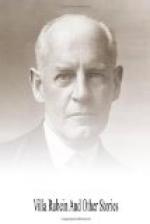“I kape it,” she said. “Mr. Ford be tu proud—but other folks be proud tu. ’Tis a pra-aper old fam’ly: all the women is Margery, Pasiance, or Mary; all the men’s Richards an’ Johns an’ Rogers; old as they apple-trees.”
Rick Voisey was a rackety, hunting fellow, and “dipped” the old farm up to its thatched roof. John Ford took his revenge by buying up the mortgages, foreclosing, and commanding his daughter and Voisey to go on living here rent free; this they dutifully did until they were both killed in a dog-cart accident, eight years ago. Old Ford’s financial smash came a year later, and since then he’s lived here with Pasiance. I fancy it’s the cross in her blood that makes her so restless, and irresponsible: if she had been all a native she’d have been happy enough here, or all a stranger like John Ford himself, but the two strains struggling for mastery seem to give her no rest. You’ll think this a far-fetched theory, but I believe it to be the true one. She’ll stand with lips pressed together, her arms folded tight across her narrow chest, staring as if she could see beyond the things round her; then something catches her attention, her eyes will grow laughing, soft, or scornful all in a minute! She’s eighteen, perfectly fearless in a boat, but you can’t get her to mount a horse—a sore subject with her grandfather, who spends most of his day on a lean, half-bred pony, that carries him like a feather, for all his weight.
They put me up here as a favour to Dan Treffry; there’s an arrangement of L. s. d. with Mrs. Hopgood in the background. They aren’t at all well off; this is the largest farm about, but it doesn’t bring them in much. To look at John Ford, it seems incredible he should be short of money—he’s too large.




